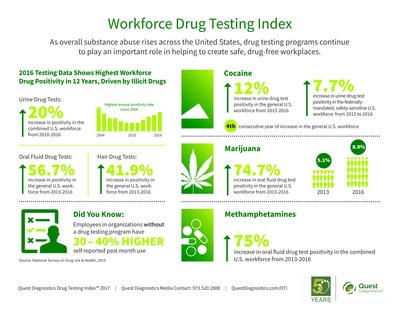Amendment 64 would, among other things, allow individuals age 21 and over to possess and use one ounce or less of marijuana. If the Amendment passes next week, employers will face increased uncertainty when it comes to the enforcement of workplace drug testing policies. A reckoning is inevitable because the debate over the scope of employers' rights to terminate workers who use marijuana outside of work and then test positive in violation of company policy has been brewing for several years in the context of Amendment 20 (which decriminalized the use of medical marijuana by registered patients). Amendment 64 does not clarify the extent of employers' right to terminate for marijuana use. On the contrary, it fans the flames by incorporating language that fueled employment litigation in the medical marijuana context following Amendment 20's passage, and by extending coverage to the general workforce, not just a handful of employees who are registered medical marijuana patients.
The debate to date
In November 2000 Colorado voters approved Amendment 20, which authorizes patients with certain debilitating medical conditions to receive from the State of Colorado a registry identification card allowing them to obtain and use marijuana without threat of criminal prosecution by the state authorities (but not the federal government).
With regard to employers' rights, Amendment 20 states: "Nothing in this section shall require any employer to accommodate the medical use of marijuana in any workplace." Both sides of the debate agree that this language preserves employers' right to prohibit employees from using marijuana at work, regardless of whether employees hold medical marijuana cards.
The parties sharply diverge, however, on the subject of whether Amendment 20 preserves employers' right to prohibit medical marijuana users from reporting to duty under the influence of, or having trace amounts of, the drug in their systems due to off-duty use. This issue typically arises when an employee tests positive for THC (the psychoactive constituent found in marijuana) in a random or post-accident workplace drug screen. Because most workplace drug testing policies prohibit employees from using illegal drugs as defined by federal or state law, employees are typically terminated following such positive results.
In recent years, medical marijuana cardholders who have been terminated from jobs for failing workplace drug screens have argued that the "in any workplace" language allows employers to regulate medical marijuana use at work, but not during non-working hours. These legal arguments take many forms, but the predominate themes in litigation to date are that (1) medical marijuana use is not illegal under state law and (2) employers should not be permitted to regulate an employee's off-duty medical marijuana use absent evidence that a worker is actually impaired at work. One obvious Colorado law that is triggered in the context of this argument is Colorado's lawful off-duty activity statute, which makes it unlawful for employers to terminate workers for engaging in lawful activities outside of work during non-working hours.
On the flipside, employers assert that Amendment 20 does not place any obligation upon companies to accommodate employees who use medical marijuana. Employers are free to enforce their drug testing policies and to prohibit the use of illegal drugs, including marijuana, whether medical or not, even when the use occurs off the worksite during non-working hours. Employers further assert that the Amendment is intended to provide certain individuals with an affirmative defense against criminal prosecution, but not to restrict employers' rights. Moreover, because marijuana is still illegal under federal law, an employee's use of marijuana outside of work is not a "lawful" activity that is covered by Colorado's lawful off-duty activity statute.
To date, Colorado courts have not squarely addressed whether employers can lawfully terminate employees who use medical marijuana outside of work during non-working hours and subsequently fail workplace drug screens. The Colorado Court of Appeals came close to weighing in on the issue in 2011 when it upheld the Colorado Industrial Claim Appeals Office's (ICAO's) decision to deny unemployment benefits to a worker, Jason Beinor, who was terminated for violating his employer's zero-tolerance drug policy after testing positive for marijuana in a random drug test. See Beinor v. Indus. Claim Appeals Office, 262 P.3d 970 (Colo. App. 2011).
Beinor argued that the Colorado Constitution protected his marijuana use because he used marijuana for medicinal purposes outside of work and was in the process of obtaining a registry card. In its opinion, the Court of Appeals made the following observations: (1) marijuana remains a Schedule I controlled substance under federal law and cannot be lawfully "prescribed;" (2) Amendment 20 provides an exemption from criminal prosecution – it does not grant medical marijuana users the "right to use the drug in any place or in any manner;" and (3) medical marijuana users do not have an "unfettered right to violate employers' policies and practices regarding use of controlled substances." However, the court cautioned that its holding was limited to the issue of whether the ICAO properly denied unemployment benefits. By contrast, the court was "not deciding whether the amendment limits an employer from discharging an employee for using medical marijuana." Thus, while the decision provides some helpful guidance into the direction Colorado courts would likely take in the future if faced with the issue, the debate concerning the extent of employers' right to terminate employees for engaging in off-duty use of medical marijuana remains unresolved.
Employers' rights under Amendment 64
Amendment 64 does not provide any additional guidance on this issue. The Amendment contains three provisions that address employers' rights. First, like Amendment 20, Amendment 64 does not require employers to "permit or accommodate" the use of marijuana "in the workplace." Second, employers may have policies restricting the use of marijuana by employees. Third, employers may prohibit and regulate the "possession, consumption, use, display, transfer, distribution, sale, transportation, or growing of marijuana" on their property.
Thus, like Amendment 20, Amendment 64 opens the door for employees to argue that employers may regulate marijuana use inside the workplace, but may not impede employees' right to use marijuana outside of work. However, unlike Amendment 20, which provides an affirmative defense to criminal prosecution, Amendment 64 would decriminalize marijuana use under state law. Additionally, Amendment 64 purports to allow employers to retain policies restricting employees' use of marijuana; however, the Amendment does not specify whether such restrictions may lawfully extend to off-duty use. If the arguments lodged in the context of Amendment 20 are any indication, employees who are terminated for testing positive for marijuana will likely continue to argue that employers' policies may only regulate use and possession on company property.
Employers' drug testing policies at center stage
If Amendment 64 passes, employers' drug testing policies will be at the heart of workplace disputes over employees' marijuana use. Because marijuana use is expected to grow if the Amendment passes, employers may expect that a greater number of employees will likely test positive for the drug in random screens. This increase in positive tests, in turn, will likely lead to a greater number of challenges by employees terminated for violating their employers' zero-tolerance policies. Further, because marijuana use would be lawful at the state level, employers would no longer be able to argue, as they did in the Amendment 20 context, that marijuana is illegal under both state and federal law.
Moreover, if Amendment 64 becomes law, employees who lose their jobs because of a drug screen revealing trace amounts of marijuana in their urine will likely argue that their employers' drug testing programs infringe upon their right under the Colorado Constitution to use marijuana outside of work. In other words, they (or their advocates) will likely take the position that, if a worker is not under the influence of marijuana at work and does not pose a safety risk, an employer may not lawfully terminate his or her employment. Workers will likely further argue that there must be outward signs of impairment at work in order for employers to legally terminate their employment.
Employers, on the other hand, will likely be forced to take a firm and even stance when interpreting and enforcing drug testing policies prohibiting the use of marijuana. Inconsistent application of such policies may expose companies to discrimination claims based on a "disparate impact" or other theory of discrimination. The practical problem that employers may face is that, unlike breathalyzer tests which can easily detect whether someone is under the influence of alcohol at work, urine tests cannot easily detect the level of marijuana impairment. Marijuana may be present in an individual's urine for several weeks. Blood tests may detect the level of marijuana in a person's system with greater accuracy, but they are more invasive and still do not pinpoint when a person actually used the drug. Further, impairment at work can go undiscovered until an accident occurs. This creates an unacceptable risk of exposure for companies which have a duty to protect employees and the public from harm. Policies that prohibit use altogether avoid these and other issues and allow employers to implement drug testing programs with greater efficiency.
Ultimately, marijuana remains a Schedule I controlled substance under federal law. Amendment 64 is clear on that point. Thus, if marijuana is legalized in Colorado, employers will need to take care to ensure that their drug policies expressly prohibit the use of illegal drugs as defined by federal law. Of course, employees who are fired or disciplined for testing positive for marijuana will still likely argue that federal law cannot usurp their right to use marijuana under Colorado's Constitution. However, employers may be able to justify their decision to continue enforcing drug testing policies through reference to federal supremacy or common sense arguments.
Bottom line
If Amendment 64 becomes law, it will ultimately be up to the courts or the legislature to settle the debate and provide employers with the clarity that the Amendment currently lacks. Resolving the unsettled issues could take months, or even years. In the meantime, employers would likely be in the trenches for the foreseeable future, incurring legal fees and spending more internal resources navigating employee grievances.



 By
By 
